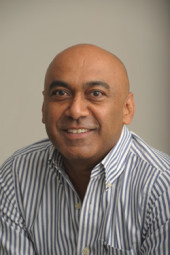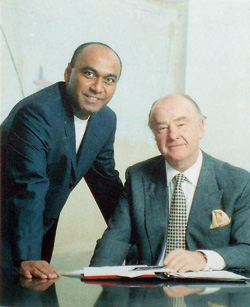Fresh-faced and newly-qualified, Mahesh Patel arrived in Papua New Guinea in 1984 to take up a job as a pharmacist. Almost 30 years on, he speaks with Andrew Wilkins about the building of retail and wholesale conglomerate CPL Group, one of PNG’s most dynamic companies.

Mahesh Patel, Chairman CPL Group
If any personal story reveals Papua New Guinea as a land of opportunity for a business person willing to persevere, it must surely be that of Fiji-born entrepreneur Mahesh Patel, who arrived in PNG with A$35 in his pocket, and is now head of one of the country’s top corporations, CPL Group.
Back in 1983, instead of returning to Fiji after graduating as a pharmacist in New Zealand, Patel decided to be more adventurous and apply for a job in PNG.
‘To be honest, I didn’t know where Papua New Guinea was. We were quite sheltered in New Zealand, back in those days . So, I applied in November and forgot about it.
‘Next April, I found myself in doing some relief work in Fiji, when I had a call from my prospective employer with a pharmacy in Taurama, near Port Moresby General Hospital.
‘I landed in Port Moresby with 35 Aussie dollars in my pocket, didn’t know what my boss looked like, didn’t know what to expect. I just went there with a very, very open mind … and it was really good.’
Nevertheless, Patel’s relationship with PNG was almost a short-lived one.
‘The turning point was in 1985, when my dad passed away in Fiji,’ Patel explains. ‘I went back and I thought I would just stay in Fiji. Then my boss rang me from Moresby to say “Come back, we are short of pharmacists here”. I had an obligation, so I headed back to finish off my contract.’
First business venture
After two more years in PNG, Patel made his first venture into business, with one of PNG’s longest-established companies.
‘ … in Australia there was a pharmacy for every 5,000 people. But, in Port Moresby, there were only three pharmacies for a population of about 250,000 to 300,000.’
‘In 1986, the Steamships Company was looking to set up pharmacies in their Stop ‘N’ Shop supermarkets. My boss wasn’t interested, so I asked Steamships if I could give them a proposal.
‘It was quite an interesting set up, because Steamships were going to provide all the infrastructure. Our part was to bring in stock and staff and that’s it. So, it was quite a soft entry into a business.’

Mahesh Patel with the late Alan Jarvis (right), former Chairman of CPL Group
Patel admits he didn’t have a clue about running a business and sensibly turned to a friend, Alan Jarvis of Bodium Construction, who became his business partner and mentor.
Even so, Patel’s business almost never got off the ground due to red tape.
‘The Foreign Investment Board knocked it back three times. At one point, they wrote to say: “We’ve got enough pharmacies in Port Moresby, we don’t need any more”. So, I pulled out statistics that showed that in Australia there was a pharmacy for every 5,000 people. But, in Port Moresby, there were only three pharmacies for a population of about 250,000 to 300,000.’
Eventually, work began on City Pharmacy in 1987.
‘Retailing has always been in my blood. The change I brought to the marketplace was front-end retail—offering a range of other goods in addition to pharmaceuticals.’
‘I think we started with K40,000 equity to bring in stock. I got married to my wife, Usha who was also a pharmacist. Basically, the first two years was just seven days a week—both of us.
‘And then we opened a second pharmacy and then a third. By 1989, we were able to keep rolling out using the same formula.
Mixed business
The CPL Group today, whilst built on its pharmacies, is a diversified business. So, at what stage did Patel say to himself: ‘I’m good at opening pharmacies, what else could I be good at?’ As Patel explains it, City Pharmacy was always about more than just selling medical goods.
‘Retailing has always been in my blood. The change I brought to the marketplace was front-end retail—offering a range of other goods in addition to pharmaceuticals. To date, our front-end business is almost 60% of any store, while 40% is pharmaceuticals and medicines.’
In 1992, City Pharmacy moved outside of Port Moresby for the first time, opening five pharmacy concessions over a five-month period.
‘We used to build a store, stock up the store overnight and be locked inside the main store. I remember particularly in Madang , sleeping on the floor at night because they locked us in, and we could only get out when the shop manager came in the morning.’
Backs to the wall
While the City Pharmacy business grew, at the end of the millennium it found itself facing a major challenge.
‘Listing has been a great advantage and I would strongly recommend a lot of family businesses do it, because it gives you transparency, accountability and discipline in the organisation.’
‘Back in 1999/2000, when the kina slipped to 16 cents or 19 cents to the US dollar, those were the real dark economic times,’ recalls Patel. ‘Interest rates had gone up to about 14% – 16% and we had our backs to the wall. We literally almost went bust. In 2001 and 2002, I did not draw a single toea as salary from the company.
‘At one stage, I remember myself and Alan Jarvis sitting in our boardroom with the bankers and Alan said: “Mahesh, give me the shop keys.” So I did, and he picked them up, threw them to the bank manager and said: “Here—you run the business!”’
Public listing
Listing on Port Moresby’s Stock Exchange (POMSoX) in 2002 was a major turning point for the business. The motivation to list was twofold:
‘Until then, both Alan and myself had to give personal guarantees to the banks, and as we grew and grew and grew, it became more uncomfortable for us. We had also wanted to start an employee share scheme.’
Patel is positive about the benefits of listing: ‘Listing has been a great advantage and I would strongly recommend a lot of family businesses do it, because it gives you transparency, accountability and discipline in the organisation.’
First major acquisition
By 2005, City Pharmacy had navigated through the tough times (as had PNG’s economy more generally), and was ready to take the next big step in its development.
Steamships was considering selling its Stop N Shop supermarket chain. With other chains such as Boroko Food World and SVS starting to put pharmacies inside their supermarkets, Patel realised his business could be over if Stop N Shop was bought out by a competitor.
‘We don’t touch anything where we cannot add any value. It’s all diversification into different retail sectors.’
So, it was decided City Pharmacy would buy the Stop N Shop itself.
‘I approached [superannuation fund] Nasfund and asked them to put in some money. We also went to Westpac and other banks. There was a lot of support from the business community. So, 2005 was when we ventured into supermarkets.’
Since the Stop N Shop acquisition, City Pharmacy has steadily expanded into a diversified group.
When Steamships put its Hardware Haus chain on the market in 2008, Patel was there again, this time partnering with Vinod Patel, his uncle, who just happens to run Fiji’s largest hardware chain.
‘Cinemas were similar. I approached people in Fiji saying “We need a cinema, we need a cinema”. They said: “Oh, we’ll do it if you partner with us.”’
Thus, Paradise Cinemas—PNG’s first multiplex cinema—opened in Port Moresby in 2012, a year after CPL launched its successful Boncafé chain of coffee shops.
Having built confidence and know-how over several joint ventures, Patel is now aggressively looking at other opportunities. CPL Group, as it is now known, has acquired the Eagle Boys pizza franchise for PNG and will open three outlets this year.
‘We’re now looking at a fashion brand out of Fiji as well,’ says Patel. ‘We don’t touch anything where we cannot add any value. It’s all diversification into different retail sectors.’
PNG’s image a challenge
That said, Patel feels his business could have grown faster but for PNG’s mixed image internationally.
‘People will pay the price if quality’s assured.’
‘We’ve approached a lot of brands in Australia, but it’s been tough. It took me two years to convince Eagle Boys to even come and do a site visit.
‘We’ve approached people like Best & Less, other clothing companies, and Dymocks Bookshop. We looked at almost 300 companies in Australia and nobody even bothered replying.’
Recognising PNG’s potential
Many overseas business people still view PNG as a poor country, but Patel’s experiences have shown him PNG’s potential as a consumer market.
‘Years ago, when digital cameras were the big thing, our biggest uptake was in the out-stations, not in Port Moresby, which clearly showed to us that people out there were hungry for good, innovative products.’
‘I see people working in my warehouse and they’ve got gadgets in their ears with iPods. People want stuff that’s available in a developed market, and it’s a pity that we as retailers and the retail sector generally are falling behind.
‘People will pay the price if quality’s assured.’
Raising the bar
Patel is clearly intent on ensuring CPL doesn’t let PNG’s aspirational consumers down.
‘There have been times when I’ve said I’ve had enough of PNG, and I’ll go out and do an international investment. Then I realise: “Well, hang on – my forte is here.’
His next project is a major retail development in Port Moresby’s central Waigani district, due to open in December 2013. It will have the aforementioned fashion store, a bookshop and a Bunnings-style hardware store to introduce PNG to the joys of doing-it-yourself.
‘We will completely change the word ‘hardware’ into DIY. We’ve aligned ourselves with a very large distributor in the US who’s helping us not only with store design, but staff training and all sorts of back-end support.
‘With a cinema and our own 5000 square metre supermarket, the centre will be state-of-the-art. We’re looking at WiFi, we’re looking at tablets in aisles for customer guidance and all that. I think customers are ready for this.’
Long-term, Patel would like to see CPL open up more businesses in PNG’s provinces:
‘At the moment we’re very Port Moresby-centric,’ he admits, ‘Although we’ve got pharmacies and hardware stores outside the capital. I would really like to see development outside of Port Moresby—in Hagen and Madang and other centres.
Looking back over his business career, Patel reflects there have been many times when we considered moving on from PNG, but every time, something keeps bringing him back.
‘There have been times when I’ve said I’ve had enough of PNG, and I’ll go out and do an international investment. Then I realise: “Well, hang on – my forte is here.’
It will certainly be interesting to watch what Patel does next, as he prepares to enter his fourth decade in PNG business.
Mahesh Patel will be a guest speaker in his capacity as Chairman, Telikom PNG, at next month’s PNG Advantage international investment summit in Port Moresby (www.pngadvantageconference.com). Andrew Wilkins is Publishing Director at Business Advantage International.
The post Entrepreneurs: Mahesh Patel OBE, Chairman of CPL Group appeared first on Business Advantage PNG.